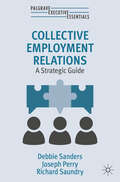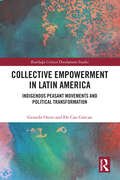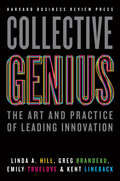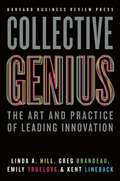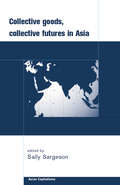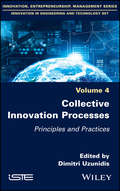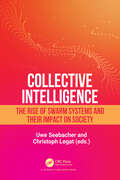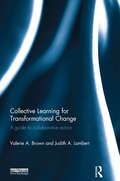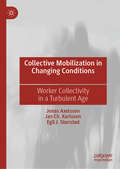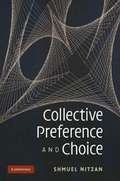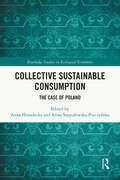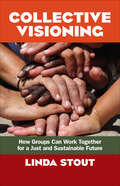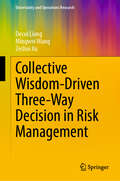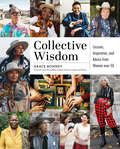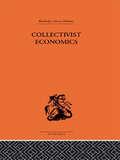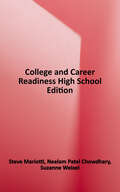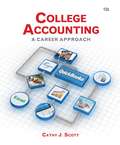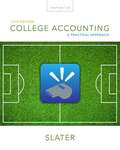- Table View
- List View
Collective Employment Relations: A Strategic Guide (Palgrave Executive Essentials)
by Richard Saundry Joseph Perry Debbie SandersIn an era of rapid technological, economic and political change, there is a growing awareness of the challenges of income inequality, employment insecurity and workplace conflict. In this context, positive relationships between management and trade unions offer an opportunity to negotiate change and create fairer and more productive workplaces. Part of the Palgrave Executive Essentials series, this engaging text is the only dedicated resource for executive learners, professionals and students of human resources and labour relations, providing a strategic management guide to employee relations in the unionised workplace. Combining theory with practical examples and tools relating to negotiations with unions and management of a unionised workforce, this book is a one-stop-shop for students, instructors and practitioners looking to supplement their understanding of employment relations with hands-on knowledge of this vitally important context. It includes case studies, reflective questions, suggested resources and further reading for additional learning. It will be a vital resource for executive education courses on employment relations and managing a unionised workforce, as well as MBA students and exec-MA students, as well as the wider practitioner community.
Collective Empowerment in Latin America: Indigenous Peasant Movements and Political Transformation (Routledge Critical Development Studies)
by Gerardo Otero Efe Can GürcanThis book develops a theory of collective empowerment that looks for change both from the bottom up, in civil society, and from the top down, from state interventions responding to such pressure.Reflecting on the advancement of Indigenous and peasant movements in Latin America since the neoliberal reformation of capitalism in the 1980s, the book outlines a path for progressive social action in which bottom-up pressure by social movements can help progressive parties to gain state power. The book considers how Indigenous and peasant movements in Argentina, Bolivia, Brazil, Ecuador, and Mexico have tried to reshape crucial structures of society from the bottom up. While this mobilization from below is critical and necessary, the book argues that these movements must be supplemented by top-down change from progressive state interventions, as happened mostly in Bolivia and Brazil. The authors conclude that progressive societal action can have massive impact in transforming some of the main socioeconomic structures that determine humans’ relation to the extraction of natural resources, income and wealth inequality, and even the location of a nation’s insertion in world capitalism.This book will be an important resource for social-movement activists and for researchers working in political sociology, sociological theory, political studies, development studies, social movements, and Latin American Studies.
Collective Forgiveness: The Constructive Power of an Enigmatic Feeling
by Oliver ErrichielloIn this age of a hyper-complex and totally interconnected world that no longer knows pauses, forgiveness is essential. The author explains that collective forgiveness is in no way inferior to love in its mysteriousness. We humans are unfathomable beings. Although we usually act thoughtfully and rationally, many actions and decisions cannot seem to be logically derived. Forgiveness - everyone knows it and has experienced it - is one of them. Forgiveness is one of the most important and exciting phenomena of human communication. The book answers questions such as: Why do we forgive some people and not others? Why does forgiveness take time? Why have people always forgiven each other - or rejected the very act of forgiving? Do we forgive individuals in a personal environment more easily or we more hesitant than with a group of people? And most importantly, why is collective forgiveness effective across time and cultures? The book is thought-provoking and offers valuable impulses to better understand one's own and social actions.This book is a translation of the original German 1st edition Kollektives Verzeihen by Oliver Errichiello, published by Springer-Verlag GmbH, DE, part of Springer Nature in 2021. The translation was done with the help of artificial intelligence (machine translation by the service DeepL.com). A subsequent human revision was done primarily in terms of content, so that the book will read stylistically differently from a conventional translation. Springer Nature works continuously to further the development of tools for the production of books and on the related technologies to support the authors.
Collective Genius
by Kent Lineback Linda A. Hill Greg Brandeau Emily TrueloveWhy can some organizations innovate time and again, while most cannot?You might think the key to innovation is attracting exceptional creative talent. Or making the right investments. Or breaking down organizational silos. All of these things may help-but there's only one way to ensure sustained innovation: you need to lead it-and with a special kind of leadership. Collective Genius shows you how. Preeminent leadership scholar Linda Hill, along with former Pixar tech wizard Greg Brandeau, MIT researcher Emily Truelove, and Being the Boss coauthor Kent Lineback, found among leaders a widely shared, and mistaken, assumption: that a "good" leader in all other respects would also be an effective leader of innovation. The truth is, leading innovation takes a distinctive kind of leadership, one that unleashes and harnesses the "collective genius" of the people in the organization.Using vivid stories of individual leaders at companies like Volkswagen, Google, eBay, and Pfizer, as well as nonprofits and international government agencies, the authors show how successful leaders of innovation don't create a vision and try to make innovation happen themselves. Rather, they create and sustain a culture where innovation is allowed to happen again and again-an environment where people are both willing and able to do the hard work that innovative problem solving requires.Collective Genius will not only inspire you; it will give you the concrete, practical guidance you need to build innovation into the fabric of your business.
Collective Genius: The Art and Practice of Leading Innovation
by Kent Lineback Linda A. Hill Greg Brandeau Emily TrueloveWhy can some organizations innovate time and again, while most cannot? You might think the key to innovation is attracting exceptional creative talent. Or making the right investments. Or breaking down organizational silos. All of these things may help#151;but there’s only one way to ensure sustained innovation: you need to lead it#151;and with a special kind of leadership. Collective Genius shows you how. Preeminent leadership scholar Linda Hill, along with former Pixar tech wizard Greg Brandeau, MIT researcher Emily Truelove, and Being the Boss coauthor Kent Lineback, found among leaders a widely shared, and mistaken, assumption: that a #147;good” leader in all other respects would also be an effective leader of innovation. The truth is, leading innovation takes a distinctive kind of leadership, one that unleashes and harnesses the #147;collective genius” of the people in the organization. Using vivid stories of individual leaders at companies like Volkswagen, Google, eBay, and Pfizer, as well as nonprofits and international government agencies, the authors show how successful leaders of innovation don’t create a vision and try to make innovation happen themselves. Rather, they create and sustain a culture where innovation is allowed to happen again and again#151;an environment where people are both willing and able to do the hard work that innovative problem solving requires. Collective Genius will not only inspire you; it will give you the concrete, practical guidance you need to build innovation into the fabric of your business.
Collective Goods: Collective Futures in East and Southeast Asia
by Sally SargesonThis edited collection explores issues surrounding the provision of collective goods within the context of post-crisis East and Southeast Asia. It includes case studies on Korea, Indonesia, China, Laos, Malaysia and Singapore among others.
Collective Innovation Processes: Principles and Practices
by Dimitri UzunidisIn macro-, meso- and micro-economic systems, the concept of innovation involves a variety of resources and functions. It includes all formal and informal institutions, networks and actors that influence innovation and act as innovation boosters within companies, at the territorial level, at the level of innovation networks or in national economies. This book deals with innovation in a globalized context in terms of the entrepreneur, enterprise, territorial and sectoral systems and national systems of innovation in which collective innovation processes are formed.
Collective Intelligence: The Rise of Swarm Systems and their Impact on Society
by Uwe Seebacher Christoph LegatUnlock the future of technology with this captivating exploration of swarm intelligence. Dive into the future of autonomous systems, enhanced by cutting-edge multi-agent systems and predictive research. Real-world examples illustrate how these algorithms drive intelligent, coordinated behavior in industries like manufacturing and energy. Discover the innovative Industrial-Disruption-Index (IDI), pioneered by Uwe Seebacher, which predicts industry disruptions using swarm intelligence. Case studies from media to digital imaging offer invaluable insights into the future of industrial life cycles.Ideal for AI enthusiasts and professionals, this book provides inspiring, actionable insights for the future. It redefines artificial intelligence, showcasing how predictive intelligence can revolutionize group coordination for more efficient and sustainable systems. A crucial chapter highlights the shift from the Green Deal to the Emerald Deal, showing how swarm intelligence addresses societal challenges.
Collective Learning for Transformational Change: A Guide to Collaborative Action
by Valerie A. Brown Judith A. LambertThe drive for change has informed human endeavour throughout history. From fields to factories to offices, people have always asked how to make things better. This innovative book offers a step by step guide for recognising the need for transformational change and kick-starting a course of implementation that leads to the creation of a productive, just and sustainable future for the given community. Drawing on over 300 cases of transformational change planned-for and supported through the process of collective learning, the book shows how a collective learning model based on open learning among diverse interests can improve communication and achieve lasting system change. Part one of the book outlines the theory and practice of collective learning, drawing on the experiential learning cycle developed by David Kolb. The practice follows the rules of open space learning, dialogue and valuing diversity and is flexible, allowing adaptation to different situations. Case studies in Part two provide examples of collective learning leading to transformational change in a wide range of contexts, from cities to councils to organisations. Part three offers thirty-three activities on which the programme designers can draw in the course of guiding transformational change, from team building, to community development, monitoring, evaluation and cross-cultural learning This guidebook differs from the traditional management of change. Not only does the process begin with sharing ideals, only later proceeding to implementation, but it also actively harnesses the full set of interests in planning direct action, seeking constructive collaboration not consensus. This groundbreaking guidebook is designed to be fun, accessible and engaging for both students and professionals in the fields of administration and governance.
Collective Memory and Intergroup Leadership: Israel as a Case Study
by Irit KeynanCollective memory is the recollection of what has been experienced in common by a group, a notion separate from individual memory. Collective memory is a powerful force that consolidates cohesion within a group, which tends to become more accentuated in times of conflict. The more traumatic the past, the stronger the collective memory's effect on the present. This chapter focuses on the different ways leaders in Israel have harnessed the power of collective memory: either to exacerbate conflict with an outside group or to encourage reconciliation. This chapter was previously published as chapter 16 of "Crossing the Divide: Intergroup Leadership in a World of Difference."
Collective Mobilization in Changing Conditions: Worker Collectivity in a Turbulent Age
by Jan Ch. Karlsson Jonas Axelsson Egil J. SkorstadThis book presents the first published account in English of Sverre Lysgaard's theory of the ‘worker collectivity’ – a theory of an informal protective organisation among subordinate employees, which so far has been unknown outside Scandinavia. Lysgaard’s theory espouses that workers collectively form a buffer against management to protect themselves from the technical/economic power, which controls their working lives. The authors have returned to the same Norwegian factory Lysgaard studied in the 1950s to carry out ethnographic fieldwork in the 1980s and 2010s, and investigate the changing nature of the production, labour processes and management strategies. Through analysis that extends over 50 years of factory life, this research documents shifting power relations between workers and employers during times of changing institutional structures, globalisation, and worker solidarity. A revised version of the theory is also presented as an answer to some of the uncovered deficiencies in the original framework. The book will be of interest to students and scholars of the sociology of work, labour studies, business management and organisation studies.
Collective Preference and Choice
by Shmuel NitzanCollective decision-making is a familiar feature of our social, political, and economic lives. It ranges from the relatively trivial (e.g. the choice of the next family car) to the globally significant (e.g. whether or not a country should go to war). Yet, whether trivial or globally significant, such decisions involve a number of challenging problems. These problems arise in the standard social choice setting, where individuals differ in their preferences. They also arise in the standard decision-making setting, where individuals share the same preferences, but differ in their decisional capabilities. The distinctive feature of Collective Preference and Choice is that it looks at classical aggregation problems that arise in three closely related areas: social choice theory, voting theory, and group decision-making under uncertainty. Using a series of exercises and examples, the book explains these problems with reference to a number of important contributions to the study of collective decision-making. <P> <i>Advisory: Bookshare has learned that this book offers only partial accessibility. We have kept it in the collection because it is useful for some of our members. To explore further access options with us, please contact us through the Book Quality link on the right sidebar. Benetech is actively working on projects to improve accessibility issues such as these. </i>
Collective Sustainable Consumption: The Case of Poland (ISSN)
by Anna Horodecka Alina Szypulewska-PorczyńskaIn the face of climate change and resulting environmental and social crises, sustainable consumption has become a widely discussed issue and a key plank of the UN’s Sustainable Development Goals (SDGs). The majority of the sustainable consumption research uses the SDG framework, but this only serves to reinforce an individualistic, efficiency-based approach and it does not sufficiently cover the specific situation of transition economies. In contrast, this volume promotes a collective approach to sustainable consumption, and combines general theoretical issues with empirical examples from the Polish economy. The first part of the book presents a theoretical approach to collective consumption which has the core concepts of justice and human nature at its heart. This approach emphasises the role of collective rationality and categorises aspects of sustainable consumption as a common and public good. The second part investigates diversified aspects of sustainability, including socio-economic inequalities as barriers to sustainable consumption, consumer sovereignty in the context of current legal regulations, and the impact on employees of changes to the types and conditions of work. It also examines the sharing economy and the legal conditions of its development. The third part adopts a political perspective focusing on the state policies enhancing the role of investment in public goods, analyses photovoltaic programmes which promote prosumption and indicates challenges to sustainability faced by many countries such as the energy crisis, sustainable finance, and cooperative platforms.This book will be of great interest to researchers and scholars interested in sustainability and consumption issues in economics, management, law, public administration, and political science.
Collective Visioning: How Groups Can Work Together for a Just and Sustainable Future (Bk Currents Ser.)
by Linda StoutDrawing on Linda Stout's 30 years of experience training organizers, advocates, activists, and coalition groups, Collective Visioning provides a revolutionary guide to collaboration within and across diverse organizations.
Collective Wisdom-Driven Three-Way Decision in Risk Management (Uncertainty and Operations Research)
by Zeshui Xu Mingwei Wang Decui LiangThis book delves deeply into the research progress on three-way risk decision for risk management under complex social environment. From the new perspective of collective wisdom, it systematically explores three-way group decision-making methods and practical applications by considering group information fusion, consensus reaching process, group social network and group complex network. This book intends to provide a reference for researchers, practitioners and graduate students in the fields of risk management and decision analysis.
Collective Wisdom: Lessons, Inspiration, and Advice from Women over 50
by Grace BonneyPOWERFUL WISDOM FROM THE ELDERS OF OUR COMMUNITIES In this rich and multilayered collection of interviews, conversations, and intimate photographs, over 100 trailblazing women describe the ups, downs, and lessons learned while forging their unique paths. Collective Wisdom celebrates the stories of those who have been there and know the road—from an Olympic athlete and a NASA team member to award-winning artists, activists, writers, and filmmakers, from women in their fifties to centenarians. It is also a tribute to the importance of intergenerational connections between women, with interviews conducted by daughters, friends, mentors, and colleagues. Collective Wisdom creates a living, breathing sense of community—a space where all of us can gather, listen, share, and learn.
Collectivist Economics
by James Haldane SmithCollectivist Economics examines such issues as the inequality of the distribution of wealth and its impact on social stability, corrupt financial institutions and economic efficiency.Chapters covering industrial organization, unemployment, international trade, prices, remuneration, taxation and insurance, and local and national government form the main part of the book.
College & Career Readiness
by Suzanne Weixel Steve Mariotti Neelam Patel ChowdharyNIMAC-sourced textbook
College & Career Readiness High School Edition
by Suzanne Weixel Steve Mariotti Neelam Patel ChowdharyCollege and Career Readiness is a broad exploration of educational and career opportunities and the rewards of higher education and different career pathways. It provides the essential tools that students need to set and achieve career and academic goals and make positive decisions that will affect their futures highlights the most promising careers and prepares students to connect academic achievement to real-world success. Students learn to identify their career interests, aptitudes, and learning styles. They discover that they can gain critical experience and develop job-related skills, including math, technology, teamwork, leadership, and effective communication. This book also helps students recognize and manage their resources and develop a career portfolio while practicing the principles of personal finance is a clear and concise text, designed to engage students by focusing on topics that are relevant to their lives today. It uses contemporary, real-world examples to encourage students to apply their skills in practical situations and to meet responsibilities by providing them with challenging learning experiences that require the practical application of academic skills.
College Accounting 5th Edition
by Burton S. Kaliski Robert L. Dansby Michael D. LawrenceThis hands-on textbook teaches the "why" along with the "how" of key accounting concepts. The applied, theory-based approach enables students to master accounting procedures because they learn why they are important.
College Accounting, Chapters 1-27 (New in Accounting from Heintz and Parry)
by Robert Parry James HeintzThe leading Heintz/Parry's COLLEGE ACCOUNTING, 22E combines a step-by-step approach and excellent examples with an online homework tool that makes accounting understandable, regardless of your accounting background or business experience. Known for its clarity and accompanying technology, this book focuses on the skills needed to transition from the classroom to the workplace. The book begins with a basic foundation and simple service company examples before advancing to accounting within the more challenging merchandising and manufacturing environments. Engaging learning features reinforce the relevance of skills you're learning and ensure an understandable presentation. To optimize study and help you efficiently complete homework, CengageNOWv2 provides interactive support, Show Me How Videos, and an adaptive learning path that focuses on areas most challenging to you individually. Plan for success in tomorrow's workplace with COLLEGE ACCOUNTING, 22E.
College Accounting: A Career Approach (12th Edition)
by Cathy J. ScottThe twelfth edition of COLLEGE ACCOUNTING: A CAREER APPROACH maintains its dedicated emphasis on the significance of the College Accounting course as true groundwork for students' future classes and jobs, and a greater focus on teaching the fundamentals of accounting from a career development approach. This text builds student skills in the areas of accounting knowledge, technology, communication, ethics, and critical thinking, providing students the skills needed to be successful in life and work. With a focus on small business, COLLEGE ACCOUNTING: A CAREER APPROACH, Twelfth Edition, provides real-world context that keeps chapter content relevant and vital.
College Accounting: A Contemporary Approach (Third Edition)
by M. David Haddock John Ellis Price Michael FarinaThe Haddock text features the successful author team Price et al. The author team based A Contemporary Approach on the solid foundation of the Price 14e textbook; however, in Haddock, the approach has been modified to fit the needs of a growing number of College Accounting instructors who teach the course without covering special journals. These instructors feel that special journals are an unnecessarily complicated subject for such a basic course. By eliminating special journal coverage, professors are free to focus on recording to the general journal and posting to the general ledger - the basic bookkeeping functions that are so important to accountants in the real world.
College Accounting: A Practical Approach
by Jeffrey SlaterCollege Accounting: A Practical Approach provides a strong foundation in the basics of accounting. The material is organized in a clear, easy-to-follow format, and each chapter contains a plethora of learning tools and practice materials to help students immediately put their skills to use. The Thirteenth Edition stays current with modern accounting tools and techniques and includes new computer workshops using Sage 50 and QuickBooks. Students are also introduced to new trends in banking technology and updated tax information.
